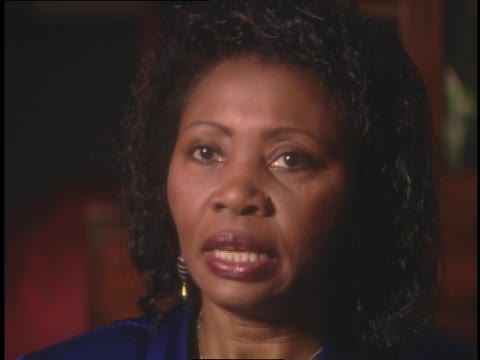American Experience; John Brown's Holy War; Interview with historian Margaret Washington, 5 of 5

- Transcript
the pancreas because it's big they've been asking for lincoln was like an agreement made it as bishop john brown was most definitely a hero in the eyes of african americans he was a hero in the highs above many people who were involved in the anti slavery movement even the pacifists the moral suasion us who did not believe in violent saw john brown as a hero because he was willing
to die for his convictions because of the lofty mess of his cause and so they saw him as a hero even though they did not condone what he did and would not have done it themselves but they felt that the times had created the moon that allowed john brown to do what he did and above all they felt that slavery was so wrong that anything that was done to end it was justified so he was a hero and he was serving a hero to african americans because he paid a supreme price for their freedom it was a totally selfless act and how can that not be heroic in their eyes it does feel that way
douglas is very close to brown before harpers ferry i think he became even closer to him afterwards so that somewhat of a void and that was his heart that he was not there and probably it made him more committed than ever to in bondage in the united states on its early probably made there was feel that a white man had made a sacrifice that he is a black man was unwilling to make on the one hand on the other hand it also probably made of this field it this was a cause that was worth dying for and douglas was not willing to die for it but if he didn't die for he certainly lived for it and that was just as important and some injustice heroic was
john ydstie people was questions that comes up and he says this has to be an issue and if it's the sixties plus suggesting that john brown was insane gives you a sense of what the nation was like give you a sense howell slavery had permeated american society to think that a man who wanted to end bondage was insane in a country that had fought for its own liberation isn't a way in itself in st john brown was fighting for the american creed john brown was putting into practice the words of
thomas jefferson that the tree of liberty should be watered with the blood of tyrants john brown was living out the american revolution in another generation so to me that was nothing in saying about what john brown was doing he was going against the grain but america had moved so far away from what it was originally founded for that people in the country saw him as insane because they didn't want to come to terms way of their own inability to see other people as the eagles play so
- Series
- American Experience
- Episode
- John Brown's Holy War
- Contributing Organization
- WGBH (Boston, Massachusetts)
- AAPB ID
- cpb-aacip-15-rf5k93293k
If you have more information about this item than what is given here, or if you have concerns about this record, we want to know! Contact us, indicating the AAPB ID (cpb-aacip-15-rf5k93293k).
- Description
- Description
- Martyr, madman, murderer, hero: John Brown remains one of history's most controversial and misunderstood figures. In the 1850s, he and his ragtag guerrilla group embarked on a righteous crusade against slavery that was based on religious faith -- yet carried out with shocking violence. His execution at Harpers Ferry sparked a chain of events that led to the Civil War. Washington talks about Sanity - suggestion illuminates times, Jefferson quote, Revolution 0x0B
- Topics
- Biography
- History
- Race and Ethnicity
- Subjects
- American history, African Americans, civil rights, slavery, abolition
- Rights
- (c) 2000-2017 WGBH Educational Foundation
- Media type
- Moving Image
- Duration
- 00:05:06
- Credits
-
- AAPB Contributor Holdings
-
WGBH
Identifier: cpb-aacip-7880fd9b53e (Filename)
Duration: 0:04:52
If you have a copy of this asset and would like us to add it to our catalog, please contact us.
- Citations
- Chicago: “American Experience; John Brown's Holy War; Interview with historian Margaret Washington, 5 of 5,” WGBH, American Archive of Public Broadcasting (GBH and the Library of Congress), Boston, MA and Washington, DC, accessed February 26, 2026, http://americanarchive.org/catalog/cpb-aacip-15-rf5k93293k.
- MLA: “American Experience; John Brown's Holy War; Interview with historian Margaret Washington, 5 of 5.” WGBH, American Archive of Public Broadcasting (GBH and the Library of Congress), Boston, MA and Washington, DC. Web. February 26, 2026. <http://americanarchive.org/catalog/cpb-aacip-15-rf5k93293k>.
- APA: American Experience; John Brown's Holy War; Interview with historian Margaret Washington, 5 of 5. Boston, MA: WGBH, American Archive of Public Broadcasting (GBH and the Library of Congress), Boston, MA and Washington, DC. Retrieved from http://americanarchive.org/catalog/cpb-aacip-15-rf5k93293k